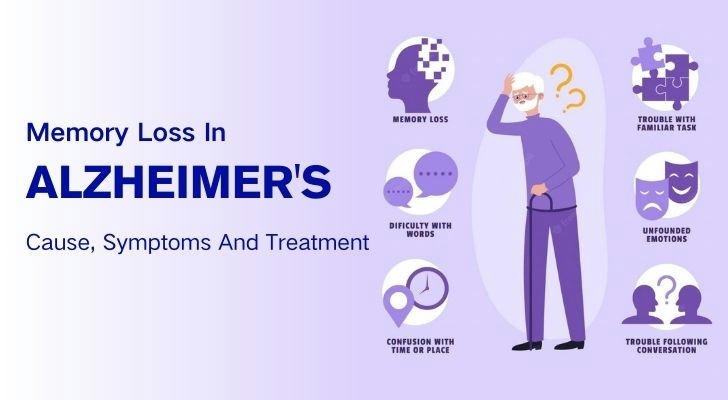Memory Alert: How to detect Alzheimer's disease early and fight it?
If you are reading this article, it may be because you or a loved one has recently shown some signs of forgetfulness, such as forgetting familiar names or suddenly feeling lost in familiar places. Don't worry, let's learn about the early signs of Alzheimer's disease and learn scientifically effective methods to delay memory decline and help the brain stay active.

Recognize the Red Flags: Early Symptoms You Can't Ignore
Memory Lapses: More Than Just Aging
Forgetting where you put your keys? That's normal. But if you start repeating the same question multiple times a day, or forget critical appointments, it's a red flag. Alzheimer's patients often misplace items and blame others for "stealing" them.
Language Troubles: When Words Escape You
Struggling to find the right word for common objects? Or suddenly unable to follow conversations? These language deficits are early signs of cognitive decline. One study found that patients with Alzheimer's used 30% fewer words in daily conversations than healthy peers.
Spatial Disorientation: Getting Lost in Familiar Places
Getting lost on the way to the bathroom in your own home? Or failing to recognize familiar landmarks? These spatial disorientation issues are often early indicators of Alzheimer's. A 2024 survey showed that 68% of patients were first brought to medical attention because they got lost.
Many people have misunderstandings about Alzheimer's disease. Here are some common misunderstandings and the corresponding truths:
Myth 1: Alzheimer's disease is just ordinary old age forgetfulness
✅ Truth: Alzheimer's disease is not normal aging, but a serious neurodegenerative disease.
Myth 2: Only the elderly will get Alzheimer's disease
✅ Truth: Although Alzheimer's disease is more common in people over 65 years old, young people may also get sick.
Myth 3: Alzheimer's disease is a genetic disease, and you will not get it if there is no family history of the disease
✅ Truth: Genetics is only one of the risk factors, and most cases are caused by multiple factors.
Myth 4: Alzheimer's disease cannot be prevented, and you can only leave it to fate if you get it
✅ Truth: Although it cannot be completely prevented, the risk of disease can be reduced through a healthy lifestyle.

Fight Back Strategies: Shield Your Brain
Food as Medicine: The MIND Diet
Proven to slash Alzheimer's risk by 53% (Rush University study):
- Daily:
🥬 Leafy greens (spinach, kale)
🫐 Berries (blueberries = brain gold) - Weekly:
🐟 Fish (salmon, mackerel)
🥜 Nuts (walnuts rule) - Avoid:
🧈 Butter (<1 tbsp/day)
🧀 Cheese (<1 serving/week)
🍔 Fast food (max 1x/week)
Exercise Prescription
- Aerobic: 150 mins/week brisk walking (grows hippocampus!)
- Strength Training: 2x/week (squats save synapses)
- Dance: Zumba or line dancing combines movement + memory
Brain Boot Camp
- Learn: New language apps (Duolingo Spanish in 10 mins/day)
- Play: Strategy games (Mahjong > Candy Crush)
- Socialize: Join a book club (discussion = neural fireworks)
Treatment Options: Current Weapons
FDA-Approved Medications
| Drug | How It Works | Effectiveness | Side Effects |
|---|---|---|---|
| Donepezil | Boosts neurotransmitters | Slows decline 6-12 months | Nausea, insomnia |
| Lecanemab | Attacks amyloid plaques | 27% slower decline (2023 trial) | Brain swelling risk |
Experimental Therapies
- Anti-tau vaccines
- Ultrasound + Antibodies to break up plaques
- Coconut Oil MCTs
Warning: Warning: Do not take medicine without authorization, first consult a doctor and follow the prescribed treatment.
There are many resources and support groups in the United States that can help families of people with Alzheimer's cope with the challenges of living with the disease, providing services such as education, emotional support, caregiver training, and financial assistance. Here are some key resources:
1. Alzheimer's Association
Main services:
✅ Provide disease information, care guidelines and the latest research
✅ Set up local chapters to provide face-to-face support and resources
✅ Online forum AlzConnected to communicate with other caregivers
2. Elderly Care Services and Resources
Main services:
✅ Help families find local long-term care, adult day care centers and other resources
✅ Provide legal, financial and medical care guidance
3. Alzheimer's Disease International
Main services:
✅ Provide global Alzheimer's information
✅ Connect with support organizations in various countries to obtain local resources

You are not alone
Although Alzheimer's disease cannot be cured, medication, non-drug interventions and a healthy lifestyle can effectively delay the disease and improve the quality of life of patients. The support of family members and caregivers is also crucial to help patients maintain their dignity and well-being.
💡 Early detection, early intervention, active management, let love and science fight against forgetting together! 💙
More details: ADI
